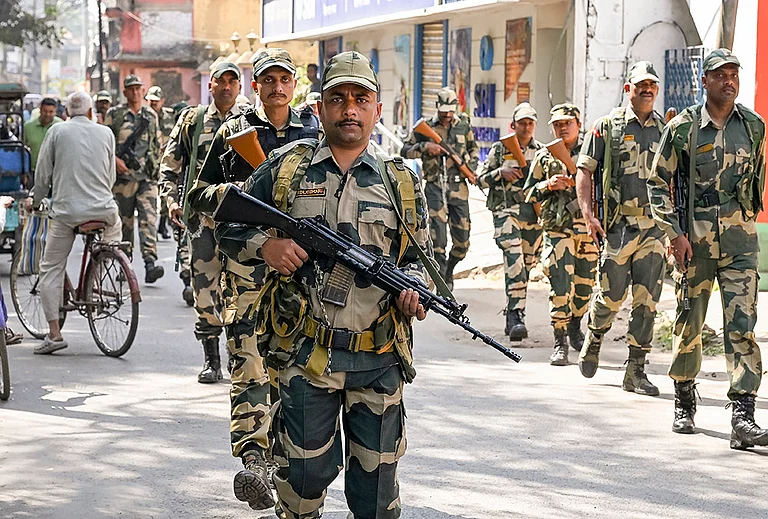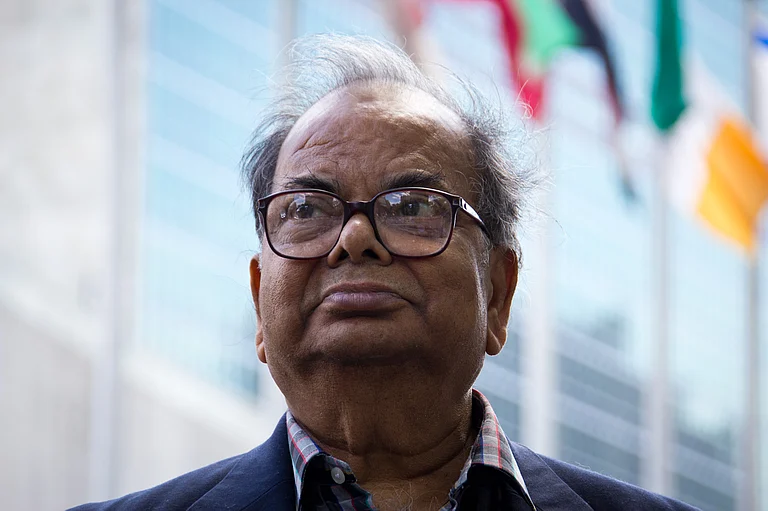India and Bangladesh are not just neighbouring countries but share the deep historical and cultural roots, particularly through legacies of Bengal's most iconic figures. Though the two countries partitioned decades back, the emotions remain high-strung.
As per reports from Bangladesh, the ancestral house of eminent litterateur and the grandfather of filmmaker Satyajit Ray, Upendrakishore Ray Chowdhury Mymensingh city is being demolished for reconstruction, marking the end of an era.
This coincidentally takes place only a few weeks after the ancestral house of noble-laureate Rabindranath Tagore in Sirajganj district was vandalised following an altercation.
Why Is This House Historic?
The house over 100 years old and is located on Harikishore Ray Chowdhury Road in Mymensingh that hold the rich legacy of the illustrious Ray family of Bengal. The three generations of Rays - Upendrakishore Ray Chowdhury, his son Sukumar Ray and the grandson Satyajit Ray have contributed to Bengali literature and arts greatly.
According to the Department of Archaeology in Bangladesh, the house was built over a century ago by Upendrakishore who was a zamindar from Masua in Kishoreganj's Katiadi upazila.
After the partition of 1947, the property came under government ownership and started housing Mymensingh Shishu Academy in 1989.
The locals fear that this demolition and reconstruction might wipe out the legacy of the Ray family in Mymensingh city and in its process, from the other side of Bengal.
Why Is The House Being Demolished?
The Ray ancestral house was used as a cultural centre called 'Mymensingh Shishu Academy' and according to Md Mehedi Zaman, the district Children Affairs Officer in Bangladesh, who told the local media that the house was left abandoned for 10 years and "new semi-concrete building with several rooms will be built" in place for the studnets of the Shishu Academy to use in future.
The Daily Star publication quoted Zaman confirming that the demolition is being carried out in accordance with 'proper procedures and necessary approvals'. He also mentioned that the house was posing threat for anyone taking shelter under it.
How Did Bangladeshis React?
Speaking on the matter to local media, Bangladeshi poet Shamim Ashraf said, "The house remained in a sorry state for years, with cracks forming on its roof -- yet the authorities never cared about the rich history these old buildings hold." He added that locals had repeatedly called for its preservation, but their requests were not heard.
Echoing a similar perspective to the issue, Sabina Yeasmin, field officer of the Department of Archaeology (Dhaka and Mymensingh divisions), told The Daily Star that the house had not been officially listed with the department, but according to surveys, it was an archaeological heritage.
Yeasmin also stated that she had personally spoken with Shishu Academy and local administration officials, urging them to protect the house, but her request was ignored.
How Has India Reacted?
India on Tuesday called on Bangladesh to reconsider its decision to demolish the ancestral property of noted filmmaker Satyajit Ray and offered help to preserve the iconic building as it symbolises Bangla cultural "renaissance".
Describing the move to demolish the "landmark" building in Mymensingh as a matter of "profound regret", New Delhi also urged Dhaka to convert it into a museum symbolising shared culture of the two countries and pledged to extend cooperation for it.
The Ministry of External Affairs in a statement conveyed, "We note with profound regret that the ancestral property of noted filmmaker and litterateur Satyajit Ray in Mymensingh, Bangladesh, belonging to his grandfather and eminent litterateur, Upendra Kishor Ray Chowdhury, is being demolished."
It said the property, presently owned by the Bangladesh government, is in a state of "disrepair".
"Given the building's landmark status, symbolising Bangla cultural renaissance, it would be preferable to reconsider the demolition and examine options for its repair and reconstruction as a museum of literature and a symbol of the shared culture of India and Bangladesh," the MEA said in the statement.
It said the government of India would be "willing" to extend cooperation for this purpose.
West Bengal Chief Minister Mamata Banerjee had earlier described the move by the Bangladeshi authorities to demolish the property as "extremely distressing" and said the building is intricately tied to the cultural history of Bengal.
"I appeal to the Bangladesh government and all the conscientious people of that country to take steps to preserve this heritage building," she said in a social media post.
Senior BJP leader Suvendu Adhikari on Wednesday welcomed the Centre's proposal to collaborate with the Bangladesh government for the repair work and said, "I express my deepest gratitude and admiration to Prime Minister Narendra Modi ji for his exemplary gesture. The Government of India's proposal to collaborate with Bangladesh for the repair and reconstruction of the ancestral property of legendary Satyajit Ray in Mymensingh, with the vision of transforming it into a Museum of Literature, and a symbol of the shared cultural heritage of India and Bangladesh, is a truly commendable initiative."
India Bangladesh Ties
This incident takes place weeks after the ancestral home of Nobel laureate Rabindranath Tagore in Bangladesh was vandalised. The Rabindra Kachharibari or Rabindra Memorial Museum is the ancestral home and revenue office of the Tagore family located in Sirajganj district.
Purchased by Rabindranath’s grandfather Dwarakanath Tagore in 1840, the premises worked as a favourite recluse for the Nobel laureate, who wrote many of his notable literary works at this site.
The Dhaka Tribune in a report quoted the Ministry of Cultural Affairs confirming that no relics or artefacts associated with Rabindranath Tagore’s memory were damaged in the incident. They also mentioned that an altercation that broke out between an employee on duty and a visitor over a parking ticket, led to a mob attack when the auditorium of the Kachharibari was vandalised and they also assaulted a director of the institution.
Later it was reported that law enforcement authorities arrested five people in connection with the incident.
The relations between India and Bangladesh has been vulnerable over the past one year after the long-standing rule by former PM Sheikh Hasina came to an end. There were reports of attacks on Hindus in the country which was criticised by the Indian government.
Both the Rays and the Tagores have contributed immensely to the cultural landscape of Bengal.
























